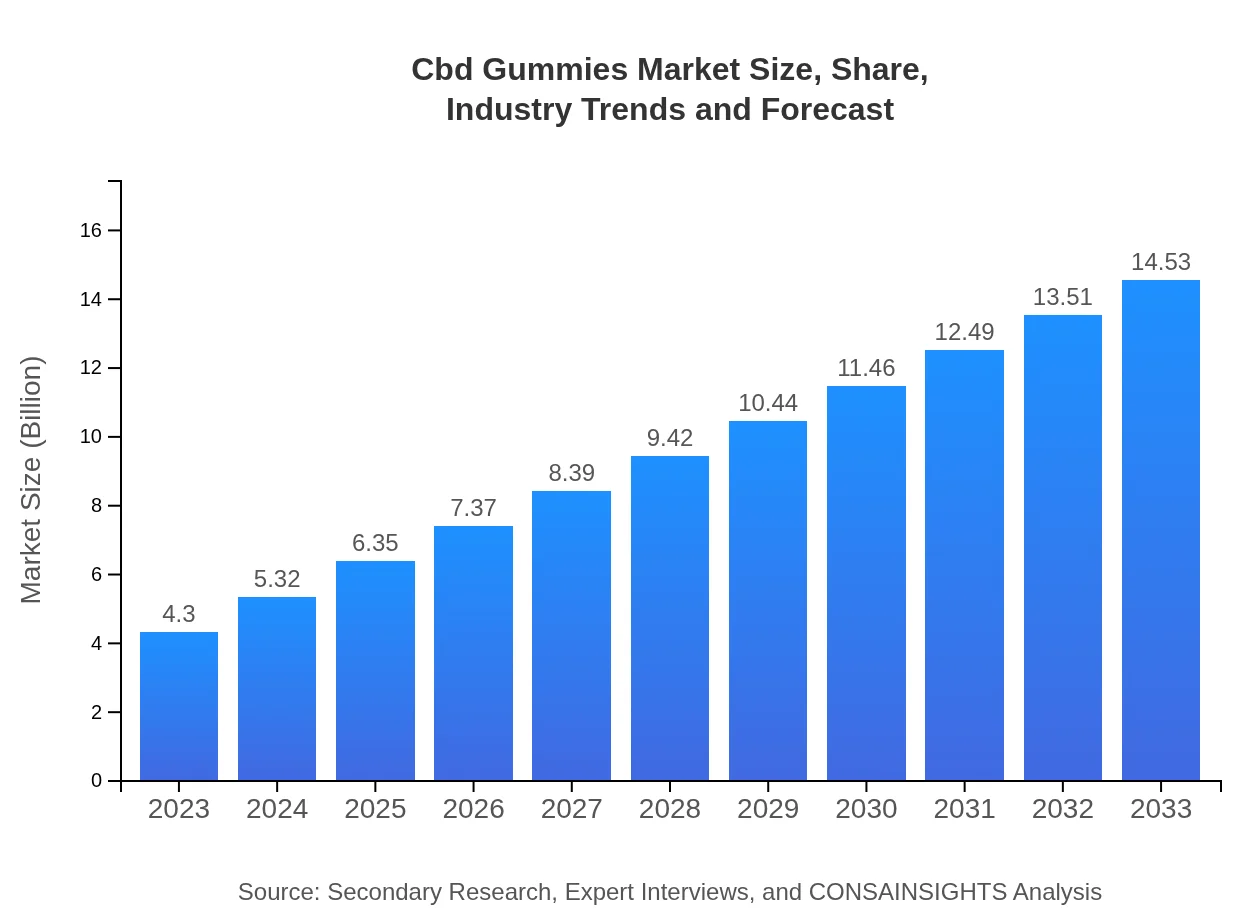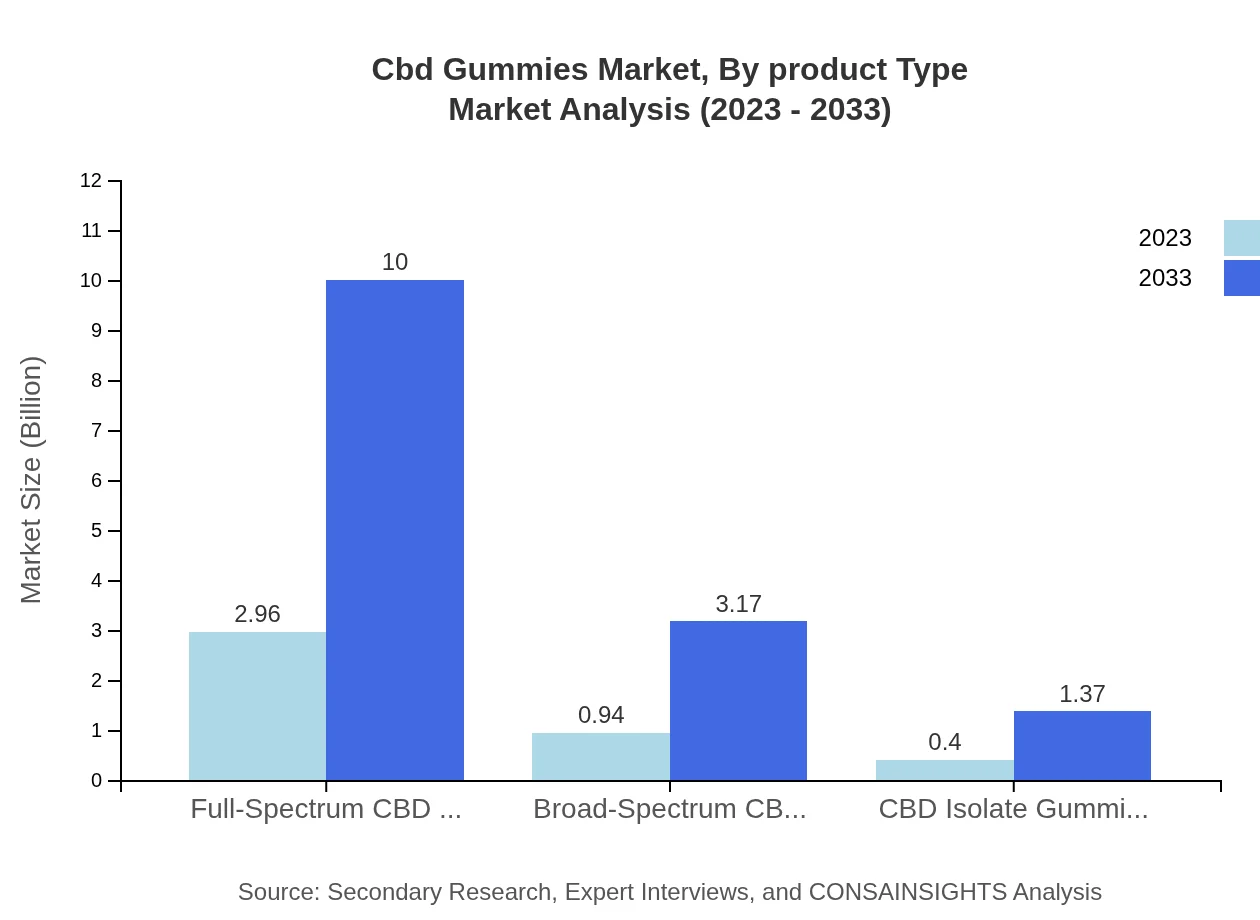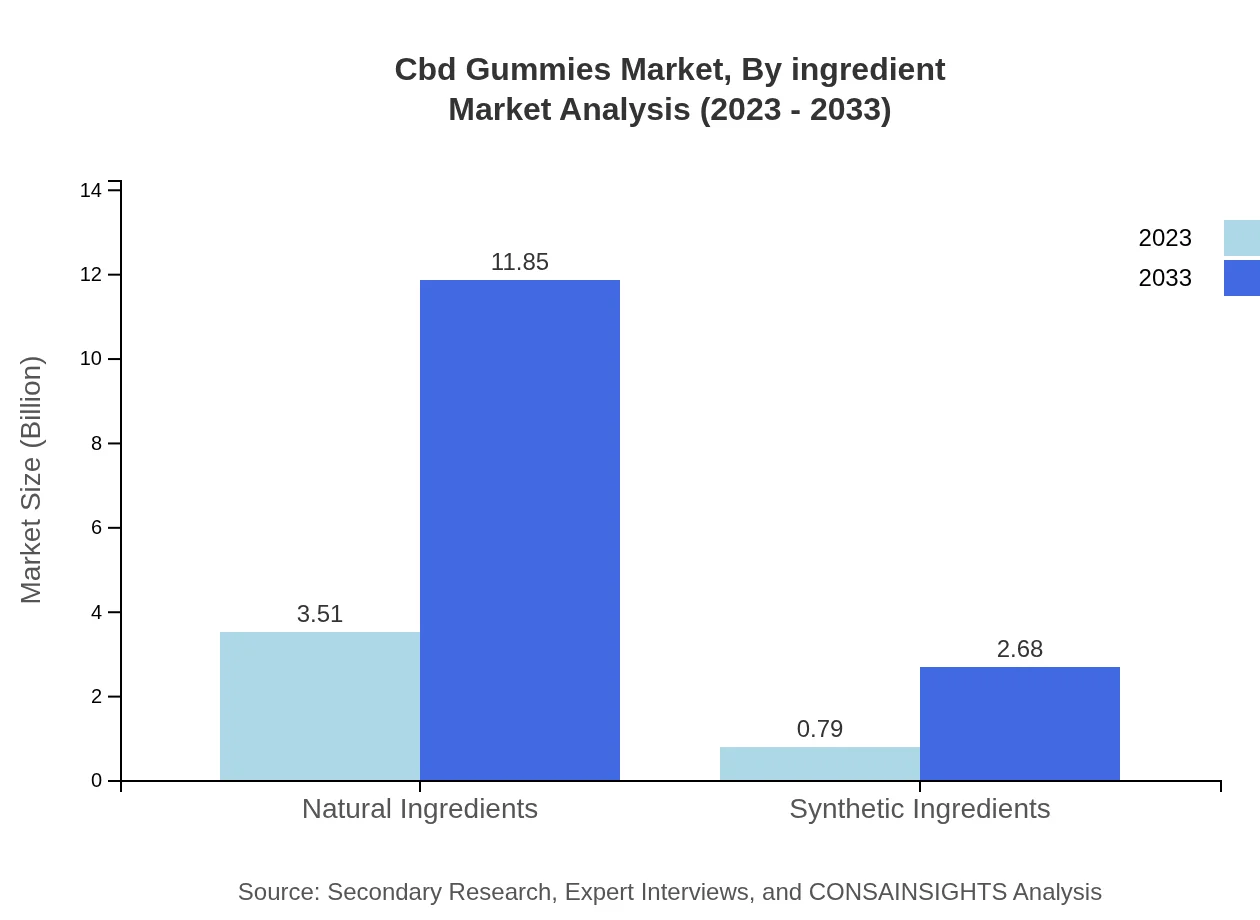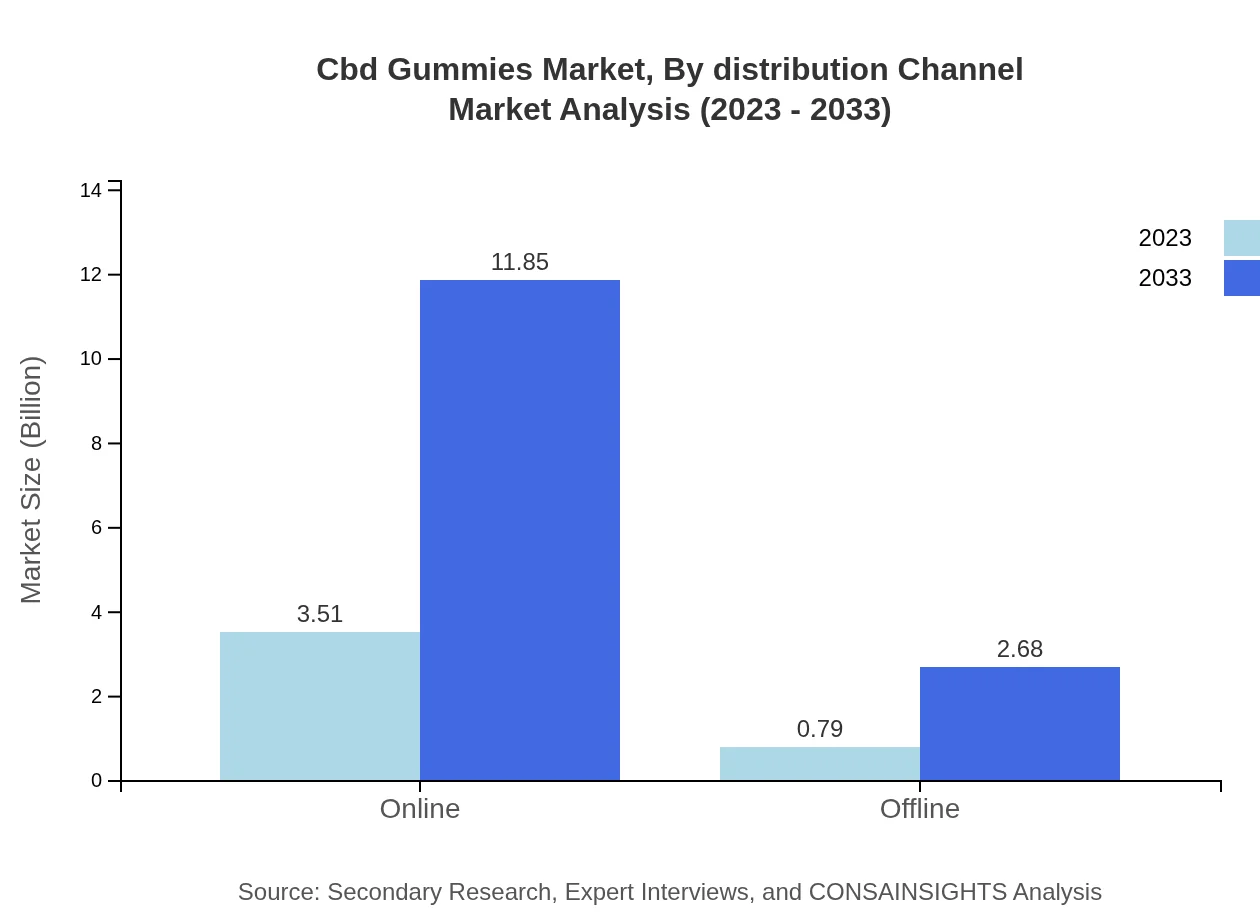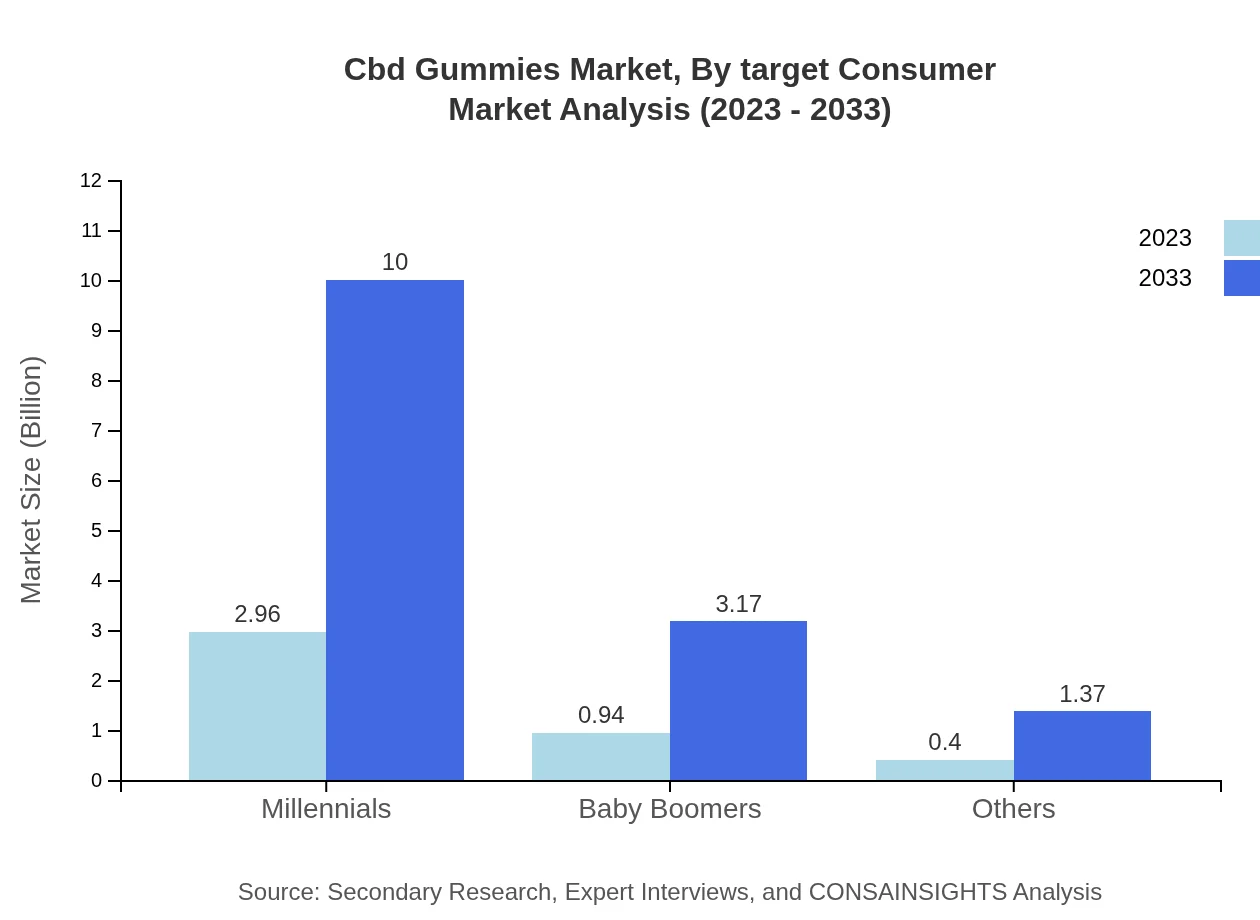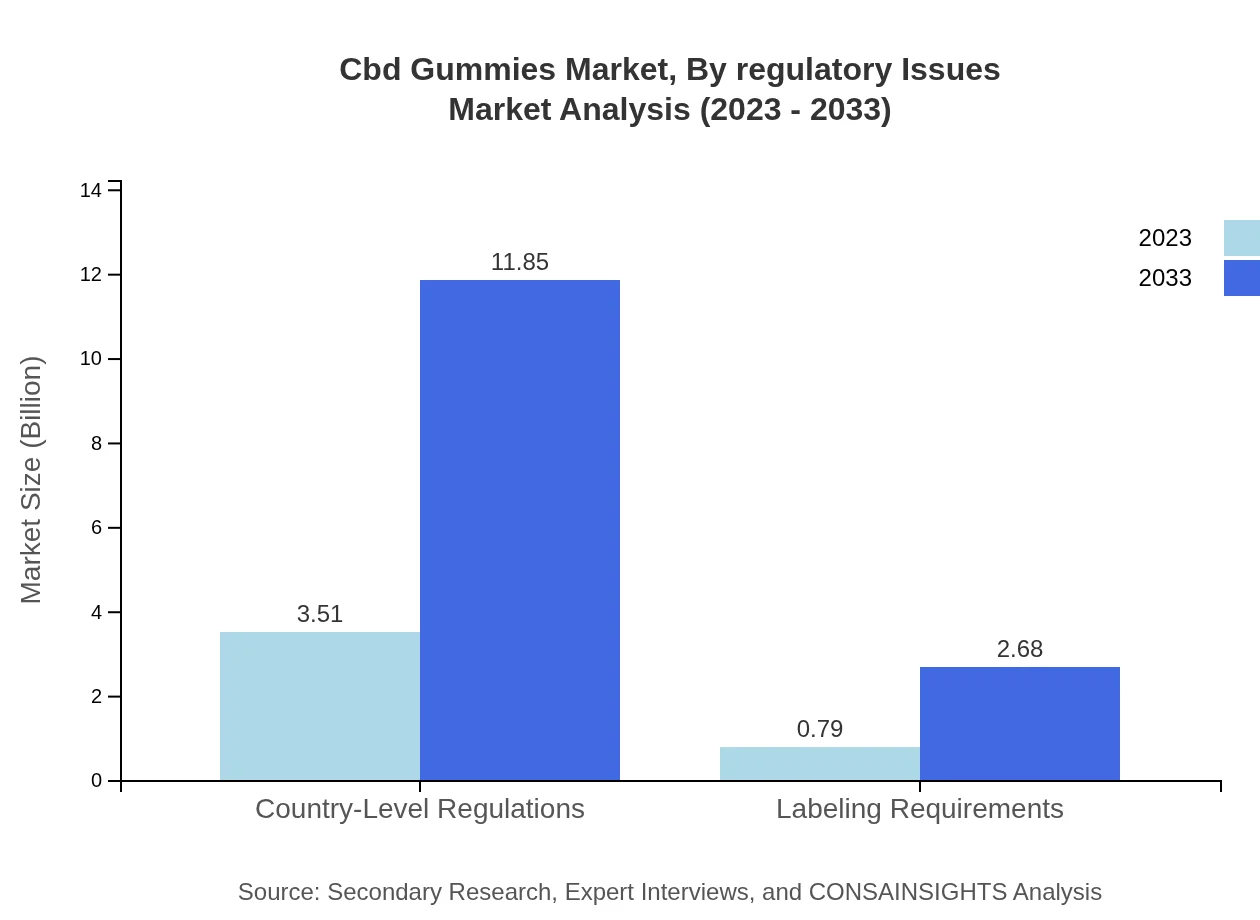Cbd Gummies Market Report
Published Date: 31 January 2026 | Report Code: cbd-gummies
Cbd Gummies Market Size, Share, Industry Trends and Forecast to 2033
This report provides a comprehensive analysis of the CBD gummies market from 2023 to 2033, highlighting market trends, size, regional insights, and industry dynamics. It aims to deliver valuable data to stakeholders for informed decision-making in this rapidly evolving sector.
| Metric | Value |
|---|---|
| Study Period | 2023 - 2033 |
| 2023 Market Size | $4.30 Billion |
| CAGR (2023-2033) | 12.4% |
| 2033 Market Size | $14.53 Billion |
| Top Companies | Charlotte's Web Holdings, Inc., Green Roads, CBDfx, Verma Farms |
| Last Modified Date | 31 January 2026 |
Cbd Gummies Market Overview
Customize Cbd Gummies Market Report market research report
- ✔ Get in-depth analysis of Cbd Gummies market size, growth, and forecasts.
- ✔ Understand Cbd Gummies's regional dynamics and industry-specific trends.
- ✔ Identify potential applications, end-user demand, and growth segments in Cbd Gummies
What is the Market Size & CAGR of CBD Gummies market in 2023 and 2033?
Cbd Gummies Industry Analysis
Cbd Gummies Market Segmentation and Scope
Tell us your focus area and get a customized research report.
Cbd Gummies Market Analysis Report by Region
Europe Cbd Gummies Market Report:
The European market is also expanding, with a projected increase from $1.29 billion in 2023 to $4.35 billion by 2033. The shift towards legalizing cannabis in several European countries is fostering a conducive environment for CBD products, with rising popularity among health-conscious consumers.Asia Pacific Cbd Gummies Market Report:
In the Asia-Pacific region, the CBD gummies market is expected to grow from $0.81 billion in 2023 to $2.73 billion by 2033. The rising interest in health products, coupled with increased investment into the wellness sector, is propelling market growth. Nations like Australia and New Zealand are leading this shift with more progressive regulations governing CBD.North America Cbd Gummies Market Report:
North America holds a significant share of the market, with projections growing from $1.63 billion in 2023 to $5.51 billion by 2033. The United States remains a primary driver due to its regulatory advancements surrounding hemp and CBD products, combined with increasing consumer demand.South America Cbd Gummies Market Report:
In South America, the market is projected to expand from $0.15 billion in 2023 to $0.51 billion in 2033. The gradual acceptance of CBD and growing interest in alternative therapies among consumers will drive this growth, although regulatory hurdles remain a challenge in some countries.Middle East & Africa Cbd Gummies Market Report:
For the Middle East and Africa, the market is expected to grow from $0.43 billion in 2023 to $1.44 billion by 2033. This growth, although slower due to conservative regulations, is gaining momentum as perceptions of CBD as a wellness product evolve.Tell us your focus area and get a customized research report.
Cbd Gummies Market Analysis By Product Type
The CBD gummies market can be segmented by product types, mainly including Full-Spectrum CBD Gummies, Broad-Spectrum CBD Gummies, and CBD Isolate Gummies. Full-spectrum gummies, which contain all cannabinoids including THC, are projected to capture 68.79% of the market share by 2033, reflecting a market size increase from $2.96 billion to $10.00 billion. Broad-spectrum products, which exclude THC, will rise from $0.94 billion to $3.17 billion, securing 21.8% market share. CBD isolate gummies, known for their purity, will grow from $0.40 billion to $1.37 billion, holding a 9.41% share.
Cbd Gummies Market Analysis By Ingredient
Market segmentation by ingredients highlights a prominent trend towards Natural Ingredients, which account for 81.57% of market share in 2023 and will maintain the same through 2033, growing from $3.51 billion to $11.85 billion. The Synthetic Ingredients segment, though smaller, is expected to expand from $0.79 billion to $2.68 billion, securing 18.43% share by 2033.
Cbd Gummies Market Analysis By Distribution Channel
Regarding distribution channels, online sales dominate the market, anticipated to grow significantly from $3.51 billion in 2023 to $11.85 billion by 2033, maintaining an 81.57% share. Offline retail will rise from $0.79 billion to $2.68 billion, retaining an 18.43% market share.
Cbd Gummies Market Analysis By Target Consumer
Target consumer segmentation indicates millennials dominate the market, projected to grow from $2.96 billion in 2023 to $10.00 billion, maintaining a significant 68.79% share. Baby boomers will increase from $0.94 billion to $3.17 billion, maintaining a 21.8% share, while 'Others' will rise from $0.40 billion to $1.37 billion, conceding a 9.41% market share.
Cbd Gummies Market Analysis By Regulatory Issues
The regulatory landscape is segmented into Country-Level Regulations and Labeling Requirements. The Country-Level Regulations segment is expected to grow from $3.51 billion to $11.85 billion by 2033, maintaining an 81.57% share, while Labeling Requirements will rise from $0.79 billion to $2.68 billion, keeping an 18.43% share.
Cbd Gummies Market Trends and Future Forecast
Tell us your focus area and get a customized research report.
Global Market Leaders and Top Companies in Cbd Gummies Industry
Charlotte's Web Holdings, Inc.:
A leading brand in the hemp-derived CBD market, Charlotte's Web offers a variety of products including CBD gummies known for their high-quality natural ingredients and commitment to sustainability.Green Roads:
Green Roads is a prominent player renowned for its pharmacist-formulated CBD products, including a range of flavored CBD gummies aimed at enhancing health and wellness.CBDfx:
CBDfx stands out with its diverse range of CBD products and innovative gummy formulations that cater to different consumer needs, including wellness and sleep support.Verma Farms:
Recognized for its Hawaiian-inspired CBD gummies, Verma Farms focuses on natural ingredients and offers a fun twist on traditional CBD products, appealing largely to a younger demographic.We're grateful to work with incredible clients.









FAQs
What is the market size of cbd Gummies?
The global CBD gummies market is valued at $4.3 billion in 2023, with a projected CAGR of 12.4% through 2033. This indicates robust growth potential and increasing consumer acceptance of CBD products in the coming years.
What are the key market players or companies in the cbd Gummies industry?
Key players in the CBD gummies market include prominent brands such as Charlotte's Web, Sunday Scaries, and Green Roads. These companies lead through innovative product offerings and strong brand recognition, contributing significantly to market growth.
What are the primary factors driving the growth in the cbd Gummies industry?
The growth in the CBD gummies market is primarily driven by rising consumer awareness of health benefits, increasing legalization of cannabis-derived products, and a growing trend towards natural and organic ingredients in consumer goods.
Which region is the fastest Growing in the cbd Gummies?
The North American region is the fastest-growing market for CBD gummies, expanding from $1.63 billion in 2023 to $5.51 billion by 2033, driven by strong consumer demand and ongoing legalization efforts across various states.
Does ConsaInsights provide customized market report data for the cbd Gummies industry?
Yes, ConsaInsights offers customized market report data tailored specifically to the CBD gummies industry, allowing clients to obtain insights that match their unique business needs and strategic objectives.
What deliverables can I expect from this cbd Gummies market research project?
From a CBD gummies market research project, you can expect detailed reports featuring market size, CAGR forecasts, competitive analysis, regional breakdowns, and insights into consumer trends and key growth drivers.
What are the market trends of cbd Gummies?
Current trends in the CBD gummies market include a significant shift towards natural and full-spectrum gummies, increasing online sales channels, and a focus on consumer education regarding the health benefits of CBD.

